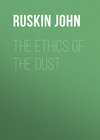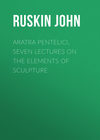Kitabı oku: «On the Old Road, Vol. 2 (of 2)», sayfa 17
Now the compass and character of essential Male-diction, so-called in Latin, or Blasphemy, so-called in Greek, may, I think, be best explained to the general reader by an instance in a very little thing, first translating the short pieces of Plato which best show the meaning of the word in codes of Greek morality.
"These are the things then" (the true order of the Sun, Moon, and Planets), "oh my friends, of which I desire that all our citizens and youths should learn at least so much concerning the Gods of Heaven, as not to blaspheme concerning them, but to eupheme reverently, both in sacrificing, and in every prayer they pray."—Laws, VII. Steph. 821.
"And through the whole of life, beyond all other need for it, there is need of Euphemy from a man to his parents, for there is no heavier punishment than that of light and winged words," (to them)? "for Nemesis, the angel of Divine Recompense, has been throned Bishop over all men who sin in such manner."—IV. Steph. 717.
The word which I have translated "recompense" is more strictly that "heavenly Justice"—the proper Light of the World, from which nothing can be hidden, and by which all who will may walk securely; whence the mystic answer of Ulysses to his son, as Athena, herself invisible, walks with them, filling the chamber of the house with light, "This is the justice of the Gods who possess Olympus." See the context in reference to which Plato quotes the line.—Laws, X. Steph. 904. The little story that I have to tell is significant chiefly in connection with the second passage of Plato above quoted.
94. I have elsewhere mentioned that I was a homebred boy, and that as my mother diligently and scrupulously taught me my Bible and Latin Grammar, so my father fondly and devotedly taught me my Scott, my Pope, and my Byron.95 The Latin grammar out of which my mother taught me was the 11th edition of Alexander Adam's—(Edinb.: Bell and Bradfute, 1823)—namely, that Alexander Adam, Rector of Edinburgh High School, into whose upper class Scott passed in October 1782, and who—previous masters having found nothing noticeable in the heavy-looking lad—did find sterling qualities in him, and "would constantly refer to him for dates, and particulars of battles, and other remarkable events alluded to in Horace, or whatever other authors the boys were reading; and called him the historian of his class" (L. i. 126). That Alex. Adam, also, who, himself a loving historian, remembered the fate of every boy at his school during the fifty years he had headed it, and whose last words—"It grows dark, the boys may dismiss," gave to Scott's heart the vision and the audit of the death of Elspeth of the Craigburn-foot.
Strangely, in opening the old volume at this moment (I would not give it for an illuminated missal) I find, in its article on Prosody, some things extremely useful to me, which I have been hunting for in vain through Zumpt and Matthiæ. In all rational respects I believe it to be the best Latin Grammar that has yet been written.
When my mother had carried me through it as far as the syntax, it was thought desirable that I should be put under a master: and the master chosen was a deeply and deservedly honored clergyman, the Rev. Thomas Dale, mentioned in Mr. Holbeach's article, "The New Fiction," (Contemporary Review for February of this year), together with Mr. Melville, who was our pastor after Mr. Dale went to St. Pancras.
95. On the first day when I went to take my seat in Mr. Dale's schoolroom, I carried my old grammar to him, in a modest pride, expecting some encouragement and honor for the accuracy with which I could repeat, on demand, some hundred and sixty close-printed pages of it.
But Mr. Dale threw it back to me with a fierce bang upon his desk, saying (with accent and look of seven-times-heated scorn), "That's a Scotch thing."
Now, my father being Scotch, and an Edinburgh High School boy, and my mother having labored in that book with me since I could read, and all my happiest holiday time having been spent on the North Inch of Perth, these four words, with the action accompanying them, contained as much insult, pain, and loosening of my respect for my parents, love of my father's country, and honor for its worthies, as it was possible to compress into four syllables and an ill-mannered gesture. Which were therefore pure, double-edged and point-envenomed blasphemy. For to make a boy despise his mother's care, is the straightest way to make him also despise his Redeemer's voice; and to make him scorn his father and his father's house, the straightest way to make him deny his God, and his God's Heaven.
96. I speak, observe, in this instance, only of the actual words and their effect; not of the feeling in the speaker's mind, which was almost playful, though his words, tainted with extremity of pride, were such light ones as men shall give account of at the Day of Judgment. The real sin of blasphemy is not in the saying, nor even in the thinking; but in the wishing which is father to thought and word: and the nature of it is simply in wishing evil to anything; for as the quality of Mercy is not strained, so neither that of Blasphemy, the one distilling from the clouds of Heaven, the other from the steam of the Pit. He that is unjust in little is unjust in much, he that is malignant to the least is to the greatest, he who hates the earth which is God's footstool, hates yet more Heaven which is God's throne, and Him that sitteth thereon. Finally, therefore, blasphemy is wishing ill to any thing; and its outcome is in Vanni Fucci's extreme "ill manners"—wishing ill to God.
On the contrary, Euphemy is wishing well to everything, and its outcome is in Burns' extreme "good manners," wishing well to—
"Ah! wad ye tak a thought, and men'!"
That is the supreme of Euphemy.
97. Fix then, first in your minds, that the sin of malediction, whether Shimei's individual, or John Bull's national, is in the vulgar malignity, not in the vulgar diction, and then note further that the "phemy" or "fame" of the two words, blasphemy and euphemy, signifies broadly the bearing of false witness against one's neighbor in the one case, and of true witness for him in the other: so that while the peculiar province of the blasphemer is to throw firelight on the evil in good persons, the province of the euphuist (I must use the word inaccurately for want of a better) is to throw sunlight on the good in bad ones; such, for instance, as Bertram, Meg Merrilies, Rob Roy, Robin Hood, and the general run of Corsairs, Giaours, Turks, Jews, Infidels, and Heretics; nay, even sisters of Rahab, and daughters of Moab and Ammon; and at last the whole spiritual race of him to whom it was said, "If thou doest well, shalt thou not be accepted?"
98. And being thus brought back to our actual subject, I purpose, after a few more summary notes on the luster of the electrotype language of modern passion, to examine what facts or probabilities lie at the root both of Goethe's and Byron's imagination of that contest between the powers of Good and Evil, of which the Scriptural account appears to Mr. Huxley so inconsistent with the recognized laws of political economy; and has been, by the cowardice of our old translators, so maimed of its vitality, that the frank Greek assertion of St. Michael's not daring to blaspheme the devil,96 is tenfold more mischievously deadened and caricatured by their periphrasis of "durst not bring against him a railing accusation," than by Byron's apparently—and only apparently—less reverent description of the manner of angelic encounter for an inferior ruler of the people.
"Between His Darkness and His Brightness
There passed a mutual glance of great politeness."
Paris, September 20, 1880.
Postscript
99. I am myself extremely grateful, nor doubt a like feeling in most of my readers, both for the information contained in the first of the two following letters; and the correction of references in the second, of which, however, I have omitted some closing sentences which the writer will, I think, see to have been unnecessary.97
North Street, Wirksworth:August 2, 1880.
Dear Sir,—When reading your interesting article in the June number of the Nineteenth Century, and your quotation from Walter Scott, I was struck with the great similarity between some of the Scotch words and my native tongue (Norwegian). Whigmaleerie, as to the derivation of which you seem to be in some perplexity, is in Norwegian Vægmaleri. Væg, pronounced "Vegg," signifying wall, and Maleri "picture," pronounced almost the same as in Scotch, and derived from at male, to paint. Siccan is in Danish sikken, used more about something comical than great, and scarcely belonging to the written language, in which slig, such, and slig en, such a one, would be the equivalent. I need not remark that as to the written language Danish and Norwegian is the same, only the dialects differ.
Having been told by some English friends that this explanation would perhaps not be without interest to yourself, I take the liberty of writing this letter. I remain yours respectfully,
Thea Berg.
Inner Temple: September 9, 1880.
Sir,—In your last article on Fiction, Foul and Fair (Nineteenth Century, September 1880) you have the following note:
"Juan viii. 5" (it ought to be 9) "but by your Lordship's quotation, Wordsworth says 'instrument' not 'daughter.'"
Now in Murray's edition of Byron, 1837, octavo, his Lordship's quotation is as follows:—
"But thy most dreaded instrument
In working out a pure intent
Is man arranged for mutual slaughter;
Yea, Carnage is thy daughter."
And his Lordship refers you to "Wordsworth's Thanksgiving Ode."
I have no early edition of Wordsworth. In Moxon's, 1844, no such lines appear in the Thanksgiving Ode, but in the ode dated 1815, and printed immediately before it, the following lines occur.
"But man is thy most awful instrument
In working out a pure intent."
It is hardly possible to avoid the conclusion that Wordsworth altered the lines after "Don Juan" was written. I am, with great respect, your obedient servant,
Ralph Thicknesse.
John Ruskin, Esq.
FICTION, FAIR AND FOUL.
V.98
THE TWO SERVANTS
100. I have assumed throughout these papers, that everybody knew what Fiction meant; as Mr. Mill assumed in his Political Economy, that everybody knew what wealth meant. The assumption was convenient to Mr. Mill, and persisted in: but, for my own part, I am not in the habit of talking, even so long as I have done in this instance, without making sure that the reader knows what I am talking about; and it is high time that we should be agreed upon the primary notion of what Fiction is.
A feigned, fictitious, artificial, supernatural, put-together-out-of-one's-head, thing. All this it must be, to begin with. The best type of it being the most practically fictile—a Greek vase. A thing which has two sides to be seen, two handles to be carried by, and a bottom to stand on, and a top to be poured out of, this, every right fiction is, whatever else it may be. Planned rigorously, rounded smoothly, balanced symmetrically, handled handily, lipped softly for pouring out oil and wine. Painted daintily at last with images of eternal things—
Forever shalt thou love, and she be fair.
101. Quite a different thing from a "cast,"—this work of clay in the hands of the potter, as it seemed good to the potter to make it. Very interesting, a cast from life may perhaps be; more interesting, to some people perhaps, a cast from death;—most modern novels are like specimens from Lyme Regis, impressions of skeletons in mud.
"Planned rigorously"—I press the conditions again one by one—it must be, as ever Memphian labyrinth or Norman fortress. Intricacy full of delicate surprise; covered way in secrecy of accurate purposes, not a stone useless, nor a word nor an incident thrown away.
"Rounded smoothly"—the wheel of Fortune revolving with it in unfelt swiftness; like the world, its story rising like the dawn, closing like the sunset, with its own sweet light for every hour.
"Balanced symmetrically"—having its two sides clearly separate, its war of good and evil rightly divided. Its figures moving in majestic law of light and shade.
"Handled handily"—so that, being careful and gentle, you can take easy grasp of it and all that it contains; a thing given into your hand henceforth to have and to hold. Comprehensible, not a mass that both your arms cannot get round; tenable, not a confused pebble heap of which you can only lift one pebble at a time.
"Lipped softly"—full of kindness and comfort: the Keats line indeed the perpetual message of it—"For ever shalt thou love, and she be fair." All beautiful fiction is of the Madonna, whether the Virgin of Athens or of Judah—Pan-Athenaic always.
And all foul fiction is leze majesté to the Madonna and to womanhood. For indeed the great fiction of every human life is the shaping of its Love, with due prudence, due imagination, due persistence and perfection from the beginning of its story to the end; for every human soul, its Palladium. And it follows that all right imaginative work is beautiful, which is a practical and brief law concerning it. All frightful things are either foolish, or sick, visits of frenzy, or pollutions of plague.
102. Taking thus the Greek vase at its best time, for the symbol of fair fiction: of foul, you may find in the great entrance-room of the Louvre, filled with the luxurious orfèvrerie of the sixteenth century, types perfect and innumerable: Satyrs carved in serpentine, Gorgons platted in gold, Furies with eyes of ruby, Scyllas with scales of pearl; infinitely worthless toil, infinitely witless wickedness; pleasure satiated into idiocy, passion provoked into madness, no object of thought, or sight, or fancy, but horror, mutilation, distortion, corruption, agony of war, insolence of disgrace, and misery of Death.
It is true that the ease with which a serpent, or something that will be understood for one, can be chased or wrought in metal, and the small workmanly skill required to image a satyr's hoof and horns, as compared to that needed for a human foot or forehead, have greatly influenced the choice of subject by incompetent smiths; and in like manner, the prevalence of such vicious or ugly story in the mass of modern literature is not so much a sign of the lasciviousness of the age, as of its stupidity, though each react on the other, and the vapor of the sulphurous pool becomes at last so diffused in the atmosphere of our cities, that whom it cannot corrupt, it will at least stultify.
103. Yesterday, the last of August, came to me from the Fine Art Society, a series of twenty black and white scrabbles99 of which I am informed in an eloquent preface that the author was a Michael Angelo of the glebe, and that his shepherds and his herdswomen are akin in dignity and grandeur to the prophets and Sibyls of the Sistine.
Glancing through the series of these stupendous productions, I find one peculiarly characteristic and expressive of modern picture-making and novel-writing,—called "Hauling" or more definitely "Paysan rentrant du Fumier," which represents a man's back, or at least the back of his waistcoat and trousers, and hat, in full light, and a small blot where his face should be, with a small scratch where its nose should be, elongated into one representing a chink of timber in the background.
Examining the volume farther, in the hope of discovering some trace of reasonable motive for the publication of these works by the Society, I perceive that this Michael Angelo of the glebe had indeed natural faculty of no mean order in him, and that the woeful history of his life contains very curious lessons respecting the modern conditions of Imagination and Art.
104. I find in the first place, that he was a Breton peasant; his grandmother's godson, baptized in good hope, and christened Jean, after his father, and François after the Saint of Assisi, his godmother's patron. It was under her care and guidance and those of his uncle, the Abbé Charles, that he was reared; and the dignified and laborious earnestness of these governors of his was a chief influence in his life, and a distinguishing feature in his character. The Millet family led an existence almost patriarchal in its unalterable simplicity and diligence; and the boy grew up in an environment of toil, sincerity and devoutness. He was fostered upon the Bible, and the great book of nature.... When he woke, it was to the lowing of cattle and the song of birds; he was at play all day, among "the sights and sounds of the open landscape; and he slept with the murmur of the spinning-wheel in his ears, and the memory of the evening prayer in his heart.... He learned Latin from the parish priest, and from his uncle Charles; and he soon came to be a student of Virgil, and while yet young in his teens began to follow his father out into the fields, and thenceforward, as became the eldest boy in a large family, worked hard at grafting and plowing, sowing and reaping, scything and shearing and planting, and all the many duties of husbandmen. Meanwhile, he had taken to drawing … copied everything he saw, and produced not only studies but compositions also; until at last his father was moved to take him away from farming, and have him taught painting."
105. Now all this is related concerning the lad's early life by the prefatory and commenting author, as if expecting the general reader to admit that there had been some advantage for him in this manner of education:—that simplicity and devoutness are wholesome states of mind; that parish curés and uncle Abbés are not betrayers or devourers of youthful innocence—that there is profitable reading in the Bible, and something agreeably soothing—if not otherwise useful—in the sound of evening prayer. I may observe also in passing, that his education, thus far, is precisely what, for the last ten years, I have been describing as the most desirable for all persons intending to lead an honest and Christian life: (my recommendation that peasants should learn Latin having been, some four or five years ago, the subject of much merriment in the pages of Judy and other such nurses of divine wisdom in the public mind.) It however having been determined by the boy's father that he should be a painter, and that art being unknown to the Abbé Charles and the village Curé (in which manner of ignorance, if the infallible Pope did but know it, he and his now artless shepherds stand at a fatal disadvantage in the world as compared with monks who could illuminate with color as well as word)—the simple young soul is sent for the exalting and finishing of its artistic faculties to Paris.
106. "Wherein," observers my prefatory author, "the romantic movement was in the full tide of prosperity."
Hugo had written "Notre Dame," and Musset had published "Rolla" and the "Nuits"; Balzac the "Lys dans la Vallée"; Gautier the "Comédie de la Mort"; Georges Sand "Léone Léonie"; and a score of wild and eloquent novels more; and under the instruction of these romantic authors, his landlady, to whom he had intrusted the few francs he possessed, to dole out to him as he needed, fell in love with him, and finding he could not, or would not, respond to her advances, confiscated the whole deposit, and left him penniless. The preface goes on to tell us how, not feeling himself in harmony with these forms of Romanticism, he takes to the study of the Infinite, and Michael Angelo; how he learned to paint the Heroic Nude; how he mixed up for imitation the manners of Rubens, Ribera, Mantegna, and Correggio; how he struggled all his life with neglect, and endured with his family every agony of poverty; owed his butcher and his grocer, was exposed to endless worry and annoyance from writs and executions; and when first his grandmother died, and then his mother, neither death-bed was able to raise the money that would have carried him from Barbizon to Gruchy.
The work now laid before the public by the Fine Art Society is to be considered, therefore—whatever its merits or defects may be—as an expression of the influence of the Infinite and Michael Angelo on a mind innocently prepared for their reception. And in another place I may take occasion to point out the peculiar adaptability of modern etching to the expression of the Infinite, by the multitude of scratches it can put on a surface without representing anything in particular; and to illustration of the majesty of Michael Angelo by preference of the backs and legs of people to their faces.
107. But I refer to the book in this paper, partly indeed because my mind is full of its sorrow, and I may not be able to find another opportunity of saying so; but chiefly, because the author of the preface has summed the principal authors of depraved Fiction in a single sentence; and I want the reader to ask himself why, among all the forms of the picturesque which were suggested by this body of literary leaders, none were acceptable by, none helpful to, the mind of a youth trained in purity and faith.
He will find, if he reflect, that it is not in romantic, or any other healthy aim, that the school detaches itself from those called sometimes by recent writers "classical"; but first by Infidelity, and an absence of the religious element so total that at last it passes into the hatred of priesthood which has become characteristic of Republicanism; and secondly, by the taint and leprosy of animal passion idealized as a governing power of humanity, or at least used as the chief element of interest in the conduct of its histories. It is with the Sin of Master Anthony that Georges Sand (who is the best of them) overshadows the entire course of a novel meant to recommend simplicity of life—and by the weakness of Consuelo that the same authoress thinks it natural to set off the splendor of the most exalted musical genius.
I am not able to judge of the degree of moral purpose, or conviction, with which any of the novelists wrote. But I am able to say with certainty that, whatever their purpose, their method is mistaken, and that no good is ever done to society by the pictorial representation of its diseases.
108. All healthy and helpful literature sets simple bars between right and wrong; assumes the possibility, in men and women, of having healthy minds in healthy bodies, and loses no time in the diagnosis of fever or dyspepsia in either; least of all in the particular kind of fever which signifies the ungoverned excess of any appetite or passion. The "dullness" which many modern readers inevitably feel, and some modern blockheads think it creditable to allege, in Scott, consists not a little in his absolute purity from every loathsome element or excitement of the lower passions; so that people who live habitually in Satyric or hircine conditions of thought find him as insipid as they would a picture of Angelico's. The accurate and trenchant separation between him and the common railroad-station novelist is that, in his total method of conception, only lofty character is worth describing at all; and it becomes interesting, not by its faults, but by the difficulties and accidents of the fortune through which it passes, while, in the railway novel, interest is obtained with the vulgar reader for the vilest character, because the author describes carefully to his recognition the blotches, burrs and pimples in which the paltry nature resembles his own. The "Mill on the Floss" is perhaps the most striking instance extant of this study of cutaneous disease. There is not a single person in the book of the smallest importance to anybody in the world but themselves, or whose qualities deserved so much as a line of printer's type in their description. There is no girl alive, fairly clever, half educated, and unluckily related, whose life has not at least as much in it as Maggie's, to be described and to be pitied. Tom is a clumsy and cruel lout, with the making of better things in him (and the same may be said of nearly every Englishman at present smoking and elbowing his way through the ugly world his blunders have contributed to the making of); while the rest of the characters are simply the sweepings out of a Pentonville omnibus.100
109. And it is very necessary that we should distinguish this essentially Cockney literature, developed only in the London suburbs, and feeding the demand of the rows of similar brick houses, which branch in devouring cancer round every manufacturing town,—from the really romantic literature of France. Georges Sand is often immoral; but she is always beautiful, and in the characteristic novel I have named, "Le Péché de Mons. Antoine," the five principal characters, the old Cavalier Marquis,—the Carpenter,—M. de Chateaubrun,—Gilberte,—and the really passionate and generous lover, are all as heroic and radiantly ideal as Scott's Colonel Mannering, Catherine Seyton, and Roland Graeme; while the landscape is rich and true with the emotion of years of life passed in glens of Norman granite and beside bays of Italian sea. But in the English Cockney school, which consummates itself in George Eliot, the personages are picked up from behind the counter and out of the gutter; and the landscape, by excursion train to Gravesend, with return ticket for the City-road.
110. But the second reason for the dullness of Scott to the uneducated or miseducated reader lies far deeper; and its analysis is related to the most subtle questions in the Arts of Design.
The mixed gayety and gloom in the plan of any modern novel fairly clever in the make of it, may be likened, almost with precision, to the patchwork of a Harlequin's dress, well spangled; a pretty thing enough, if the human form beneath it be graceful and active. Few personages on the stage are more delightful to me than a good Harlequin; also, if I chance to have nothing better to do, I can still read my Georges Sand or Alfred de Musset with much contentment, if only the story end well.
But we must not dress Cordelia or Rosalind in robes of triangular patches, covered with spangles, by way of making the coup d'œil of them less dull; and so the story-telling of Scott is like the robe of the Sistine Zipporah—embroidered only on the edges with gold and blue, and the embroidery involving a legend written in mystic letters.
And the interest and joy which he intends his reader to find in his tale, are in taking up the golden thread here and there in its intended recurrence—and following, as it rises again and again, his melody through the disciplined and unaccented march of the fugue.
111. Thus the entire charm and meaning of the story of the Monastery depend on the degree of sympathy with which we compare the first and last incidents of the appearance of a character, whom perhaps not one in twenty readers would remember as belonging to the dramatis personæ—Stawarth Bolton.
Childless, he assures safety in the first scene of the opening tale to the widow of Glendinning and her two children—the elder boy challenging him at the moment, "I will war on thee to the death, when I can draw my father's sword." In virtually the last scene, the grown youth, now in command of a small company of spearmen in the Regent Murray's service, is on foot, in the first pause after the battle at Kennaquhair, beside the dead bodies of Julian Avenel and Christie, and the dying Catherine.101
Glendinning forgot for a moment his own situation and duties, and was first recalled to them by a trampling of horse, and the cry of St. George for England, which the English soldiers still continued to use. His handful of men, for most of the stragglers had waited for Murray's coming up, remained on horseback, holding their lances upright, having no command either to submit or resist.
"There stands our captain," said one of them, as a strong party of English came up, the vanguard of Foster's troop.
"Your captain! with his sword sheathed, and on foot in the presence of his enemy? a raw soldier, I warrant him," said the English leader. "So! ho! young man, is your dream out, and will you now answer me if you will fight or fly?"
"Neither," answered Halbert Glendinning, with great tranquillity.
"Then throw down thy sword and yield thee," answered the Englishman.
"Not till I can help myself no otherwise," said Halbert, with the same moderation of tone and manner.
"Art thou for thine own hand, friend, or to whom dost thou owe service?" demanded the English captain.
"To the noble Earl of Murray."
"Then thou servest," said the Southron, "the most disloyal nobleman who breathes—false both to England and Scotland."
"Thou liest," said Glendinning, regardless of all consequences.
"Ha! art thou so hot now, and wert so cold but a minute since? I lie, do I? Wilt thou do battle with me on that quarrel?"
"With one to one, one to two, or two to five, as you list," said Halbert Glendinning; "grant me but a fair field."
"That thou shalt have. Stand back, my mates," said the brave Englishman. "If I fall, give him fair play, and let him go off free with his people."
"Long life to the noble captain!" cried the soldiers, as impatient to see the duel as if it had been a bull.
"He will have a short life of it, though," said the sergeant, "if he, an old man of sixty, is to fight for any reason, or for no reason, with every man he meets, and especially the young fellows he might be father to. And here comes the warden, besides, to see the sword-play."
In fact, Sir John Foster came up with a considerable body of his horsemen, just as his captain, whose age rendered him unequal to the combat with so strong and active a youth as Glendinning, lost his sword.102
"Take it up for shame, old Stawarth Bolton," said the English warden; "and thou, young man, get you gone to your own friends, and loiter not here."
Notwithstanding this peremptory order, Halbert Glendinning could not help stopping to cast a look upon the unfortunate Catherine, who lay insensible of the danger and of the trampling of so many horses around her—insensible, as the second glance assured him, of all and forever. Glendinning almost rejoiced when he saw that the last misery of life was over, and that the hoofs of the war-horses, amongst which he was compelled to leave her, could only injure and deface a senseless corpse. He caught the infant from her arms, half ashamed of the shout of laughter which rose on all sides, at seeing an armed man in such a situation assume such an unwonted and inconvenient burden.









![Stones of Venice [introductions]](https://cdn.litres.ru/pub/c/cover_100/34843654.jpg)
